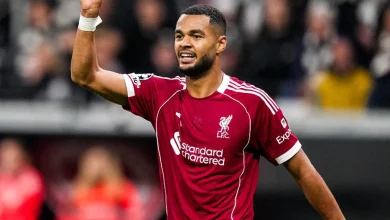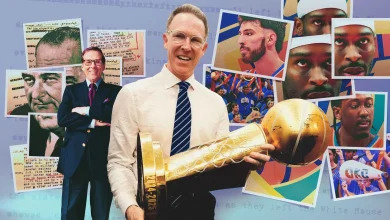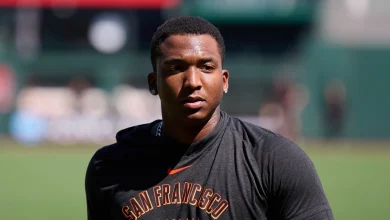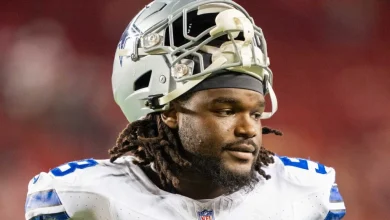The Internet Invitational was a story about fathers: Good, bad and toxic
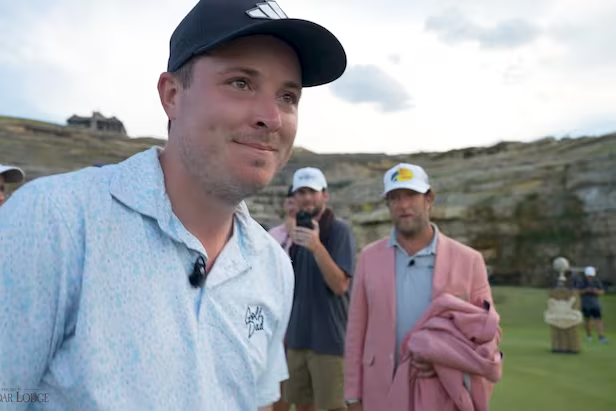
Golfpocalypse is a collection of words about golf (professional and otherwise) that sometimes, but not always, has a point. Reach out with your questions or comments on absolutely anything at shane.spr8@gmail.com. We’ll publish the best emails here.
Note: This post contains tons of spoilers for the Internet Invitational
On the first afternoon of the Internet Invitational, toward the end of the alternate shot session, a streamer called Nadeshot faced a massive approach on the 8th hole. He’d been wallowing in self-loathing for most of the round, and though self-loathing and self-deprecation were a common trait among the 48 golfers competing in this Ryder Cup-style reality show, he stood out as particularly cruel to himself. But now his team needed him, and while he stood over the ball, he mustered what passed for positive self-talk.
“I’m going to make my dad proud of me just one time,” he said. “One f*cking time. You old b*tch.”
His shot went into the bunker, he lost his match and his team got eliminated.
I have now consumed all 14 hours of the Internet Invitational, which, no hyperbole, has to be one of the most entertaining golf products ever made. I was captivated from moment one, to the extent that after about 20 minutes of viewing, I stopped to look at the run time for all six videos in the series just to see what kind of commitment I was signing up for. Faced with the staggering total—I had been hoping for maybe 10 hours—I sighed deeply and pressed on anyway. I’m so glad I did. It was psychologically riveting, laugh-out-loud funny (I’ll never forget the name Fasoli), and wildly dramatic all the way to the final hole.
So why is it that I can’t forget that quote from Nadeshot? It wasn’t especially critical to the action, and should have been washed out by the hours of content that followed, but it won’t leave my brain.
I think it’s because the more I watched the Internet Invitational, the more I thought about fathers—how they treat us, how we seek their approval and how we let each other down. A lot of you will roll your eyes as this turns into a thinkpiece about the theme of an Internet golf tournament, and I probably deserve that. But even though I’m being a nerd and should probably stop, I can’t help it, because I swear the metaphorical through-line that ran through the entire production was the role of a dad.
There were a few other dad references, from players like Fat Perez and Malosi, but I didn’t note them at the time and I’m too lazy to pore through the footage and find them now. But the bigger picture, and what became the dominant metaphor for the whole event by the time it finished, was the emergence of several surrogate dads from the larger group. Some of those dads were incredible, some were questionable and one was nightmarish.
Most of the 48 players were dudes, and aside from the notable exception of Paige Spiranac, the women that played were more muted—which is to say normal—compared to the chaos of testosterone and ego and self-loathing that surrounded them. And the men, for all their peacocking, pretty much fell into one of two categories: dad and son.
I’m serious about this. Give me any name of any dude in the event, and I can tell you if he was a father or son. Robby and Fat Perez from Bob Does Sports? Fathers. Joey? Son. Riggs? Father. Frankie? Son. Luke Kwon? Disappointing son. Jon Gruden? Heroic dad. Wesley Bryan? Dad. George Bryan? Surprisingly a son. Peter Finch? Dad. Malosi? Disgraced son. The only guy I can’t place is The Duke, who I believe is a drugged-out alien.
This is getting weird, I know. It’s weird to sort Internet golfers into a father/son rubric, when nobody asked me to do so. But some of the biggest moments in the entire event fell into that dynamic, starting almost instantly when Luke Kwon gave the production squad a gift from the content gods by missing his tee time and screwing his team.
For the most part, those teammates were rightfully pissed at him—an anger compounded by the fact that he kept concocting the world’s worst and least satisfying “apologies”—and they spent the morning sniping at him while the other team kicked their asses all across the course. Vibes were unbelievably low at the start of the afternoon round, but that’s when Jon Gruden gave a speech that remains one of the coolest parts of the whole show. It happens at the very start of the second episode, and instead of joining the Kwon pile-on, he brings everyone else to a place of shared accountability, and makes Kwon the centerpiece of the comeback. Gruden spent most of his day at the Invitational being bad at golf, but in this one moment, it became clear why he was a leader of men and a Super Bowl-winning coach—though the team was succumbing to the impulse to blame Kwon, deep down they were looking for a father figure to unite them, and Gruden knew exactly what to do. As stupid as it sounds for a reality show about golf streamers, it gave me goosebumps.
Brad Dalke, too, stood out as a tremendous fake dad. Yes, he was very good at golf, in the way that an NBA G-League player would be good if you put him against a rec league scrub who had been cut from his high school team. But it wasn’t his play that will stay with me the longest; it was the way he treated his teammates. It was particularly noticeable in his day two partnership with Lacey Snell, who was getting crushed by the pressure and wasn’t afraid to admit it. It’s hard to explain how well Dalke handled the moment, because a lot of it was subtle, but he managed to be reassuring and forgiving even as he absorbed her mistakes and carried them to a win. In the end, she made a few good shots, and it wouldn’t have been possible without the way he built her up during a total meltdown. It was a masterclass, and he deserves all the praise he’s getting online.
There were a few surrogate fathers who kind of fell in a shadow zone. Peter Finch was mostly a great teammate, but on day three he was paired with DOD King, the tightest-wound human being I have ever seen. He didn’t quite know how to handle him—granted, not the easiest job—and he defaulted to a standoffish approach before half throwing him under the bus on camera. Roger Steele was more than up to the competitive task on day one, but after getting thumped by Dalke in round three, he shrunk from what would have been a tough but winnable battle in round four, and convinced his captain Riggs to throw it instead. It landed him an easy match that he won in the anchor position, but it screwed his team and led to a wild comeback for their opponents.
Then you had Dave Portnoy. He wasn’t playing in the event, but was a constant presence anyway—a malevolent Greek chorus—and the closest thing we got to a literal father, since the Barstool employees in the event worked for him. He had actual power, and in a way that was both hilarious and disturbing, he pulled hard against his own people. He didn’t just want them to lose; he went to great lengths, including heckling, to make sure of it.
The Barstool players reacted in very different ways. The funniest and best came from Ryan Whitney, who had a classic exchange with Portnoy early on about the origin of another player’s prosthetic limb (Portnoy asked if it was “made,” and Whitney shot back with “no, they found it in the woods”) , and later called him out explicitly for rooting against his own workers.
“These two people,” he said, gesturing at Steele and Paige Spirinac, “they wouldn’t work for you, dude. They’ve read the Business Insider articles.”
But Portnoy entered his true “nightmare dad” mode with Frankie Borrelli, the Fore Play co-host and almost-champion of the entire event. If Whitney was the rebellious son who had grown disillusioned enough to bite back, Borrelli was the meek son who absorbed the abuse and convinced himself that he deserved it. People will read this and say, “it’s a bit, you moron,” but the theatrics around it were incredible. Whenever the chance allowed, Portnoy would follow Borrelli around, telling anyone who would listen that he wasn’t clutch, that he couldn’t make a short putt, etc. etc. When Borrelli failed, which he did a few times on day one, Portnoy would unleash his soulless cackle, while poor Borrelli would shrug his shoulders and weakly agree.
Then the script started to change. In the semifinal, with Portnoy looking on, Borrelli was as clutch as any player on the course, playing above his level and leading his team to the final. Watching this reversal, Portnoy seemed truly bothered, and tried to coin the nickname “Front-Nine Frankie” in the hope that he would eventually choke. He didn’t. He played even better, and the compliments Portnoy paid to Borrelli at round’s end were the definition of “grudging.”
It got worse for him when Borrelli’s clutch play continued through 17 holes of the final, even as both of his teammates were tanking their reputations with cheating scandals. But Portnoy found his joy again at the very end, when Borrelli bladed a chip into the water on 18 that put an end to the match. Portnoy collapsed to the ground, hands on his face.
“It’s awful, but at the same time, I love it,” he said. “I feel horrible and thrilled at once, it’s a weird thing.”
When they met on the green, Portnoy consoled him with, “you’re a content guy.” Borelli nodded, and they returned to a familiar place—Portnoy relieved that his charges had stopped succeeding, Borrelli protecting himself with a barrage of self-deprecation. Together, they settled back into the comfortable roles of toxic father, abject son.
What a strange, excellent show.
I asked for your stories of the worst behavior you’ve witnessed on the golf course, and this one from Bert left me blind with rage:
“While competing in a club championship match, I once witnessed a man who would ask his opponent to move his ball to the right *every single time* he was putting. A lot of times, the opponent was in his line or peripheral, but sometimes he was stating concern about hitting the man’s mark on the way down for a downhill putt or something else ludicrous.
He was infamous for doing this in matches at our club. The idea was that eventually, he would not ask to move it, and the opponent would still move it right (and forget to put it back in a spot where he hadn’t needed to move it), or the opponent would forget to move it back and putt from there, losing the hole in either case. It also just made the opponent think about something else besides making their own putt. In the ’90s, he apparently once won 4 holes in a 18-hole match with this strategy.
Because my opponent and I were playing in our own match and were not teamed up with this lunatics opponent, we could not give the opponent advice or remind him to move his coin (or not). All day, we basically turned into spectators in this absurd theater, wondering when the dam would break. At least twice, I thought for sure he was supposed to move it back and didn’t or vice versa, but the opponent was nails all day.
The man doing this insanity lost 1 down on 18 when he missed a 2 foot downhill putt that had not been given. The golf gods never miss.”
Hell yeah, golf gods. I also got this tweet from Eamon Lynch, who frankly deserves to be in jail for this behavior:
Yes, I was deeply ashamed when I caught myself laughing.

